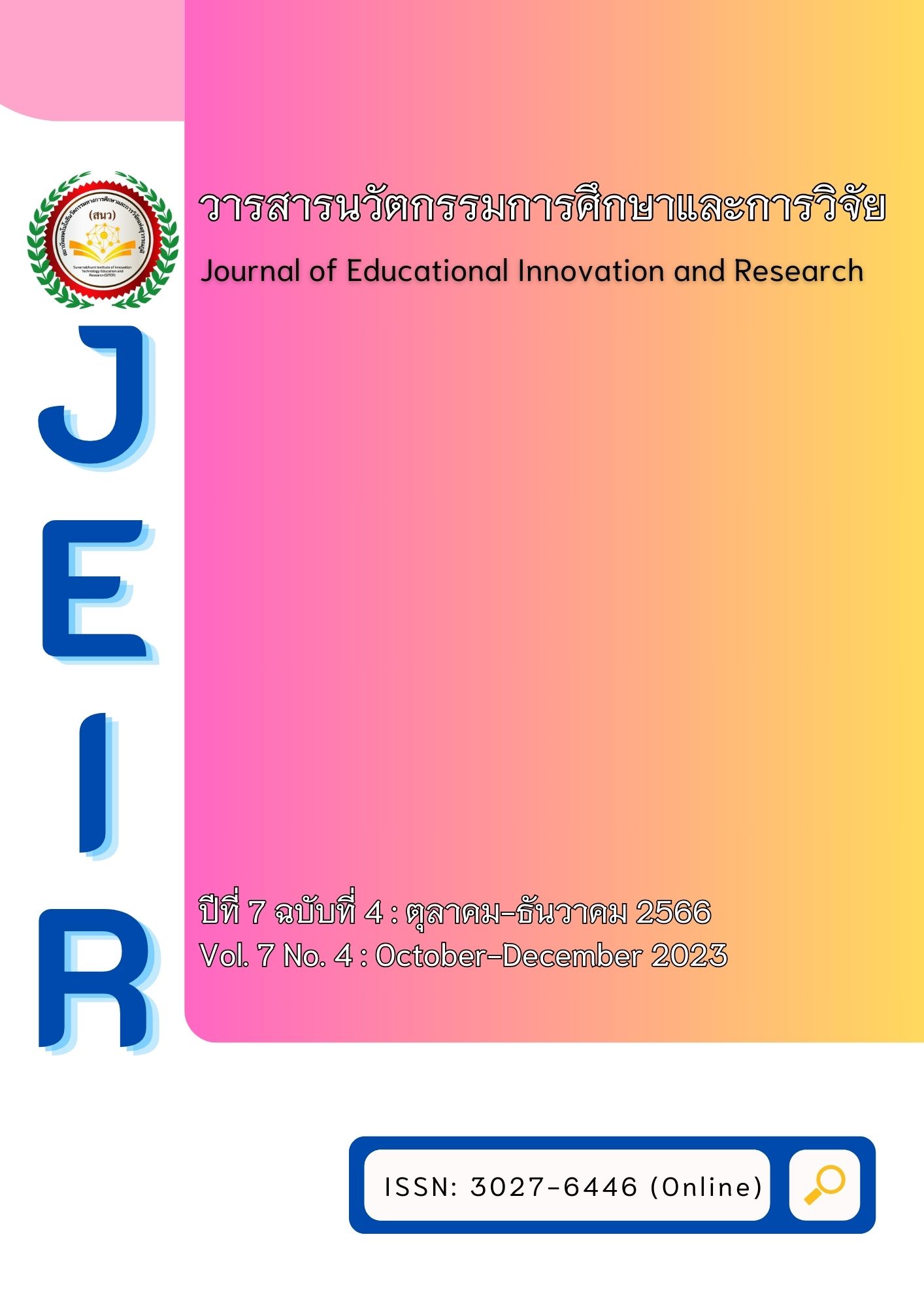กลยุทธ์การชี้แนะการจัดการเรียนการสอนออนไลน์ ของครูโรงเรียนมัธยมศึกษา
Main Article Content
บทคัดย่อ
บทความนี้มีวัตถุประสงค์เพื่อ 1) ศึกษาสภาพปัจจุบันและสภาพที่พึงประสงค์ของการชี้แนะการจัดการเรียนการสอนออนไลน์ 2) ศึกษาจุดแข็ง จุดอ่อน โอกาส และภาวะคุกคามของการชี้แนะการจัดการเรียนการสอนออนไลน์ และ 3) จัดทำกลยุทธ์การชี้แนะการจัดการเรียนการสอนออนไลน์ของครูโรงเรียนมัธยมศึกษา รูปแบบการวิจัยเป็นการวิจัยแบบผสานวิธี ประชากร คือ โรงเรียนมัธยมศึกษา สังกัดสำนักงานคณะกรรมการการศึกษาขั้นพื้นฐาน โดยให้มีกลุ่มตัวอย่าง จำนวน 180 โรงเรียนด้วยการสุ่มตัวอย่างแบบหลายขั้นตอน และมีผู้ให้ข้อมูลแต่ละโรงเรียน 5 คน ดังนี้ ผู้อำนวยการโรงเรียนรองผู้อำนวยการกลุ่มบริหารวิชาการ หัวหน้ากลุ่มสาระการเรียนรู้ 1 คน และครู 2 คน รวม 900 คน เครื่องมือที่ใช้ในการวิจัย ได้แก่ แบบสอบถามและแบบประเมินความเหมาะสมของร่างกลยุทธ์และวิเคราะห์ข้อมูลด้วยความถี่ ร้อยละ ค่าเฉลี่ย ส่วนเบี่ยงเบนมาตรฐาน ดัชนีความต้องการจำเป็น และการวิเคราะห์เนื้อหา
ผลการวิจัยพบว่า สภาพปัจจุบันและสภาพที่พึงประสงค์ภาพรวมของการชี้แนะการจัดการเรียนการสอนออนไลน์อยู่ในระดับปานกลางและระดับมาก ซึ่งด้านการวัดและประเมินผลการจัดการเรียน การสอนมีค่าเฉลี่ยสูงสุด และมีดัชนีความต้องการจำเป็นของการชี้แนะการจัดการเรียนการสอนออนไลน์ที่มีค่าสูงสุด คือ ด้านการเลือกแพลตฟอร์มการจัดการเรียนการสอน โดยกลยุทธ์การชี้แนะการจัดการเรียนการสอนออนไลน์ของครูโรงเรียนมัธยมศึกษา ประกอบด้วย 3 กลยุทธ์หลัก 6 กลยุทธ์รอง และ 29 วิธีดำเนินการ ซึ่งมีกลยุทธ์หลัก คือ 1) พัฒนานโยบายและบริหารจัดการชี้แนะการจัดการเรียนการสอนออนไลน์ 2) ส่งเสริมให้มีการชี้แนะการจัดการเรียนการสอนออนไลน์ และ 3) ส่งเสริมให้มีการวิเคราะห์ทบทวน เพื่อประเมินและติดตามผลการชี้แนะการจัดการเรียนการสอนออนไลน์
Article Details

อนุญาตภายใต้เงื่อนไข Creative Commons Attribution-NonCommercial-NoDerivatives 4.0 International License.
เอกสารอ้างอิง
Beach, D. M., & Reinhartz, J. (2000). Supervisory Leadership: Focus on Instruction. Boston: Allyn and Bacon.
Boonnak, S., Phupimthong, B., Tanpan, J., Lawansiri, P., & Anonchan, S. (2021). A Model of Online Instructional Development of Mahamakut Buddhist University, Srilanchang Campus. Journal of Srilanchang Review, 7(2), 53-70.
Costa, A. L., & Garmton, R. J. (2002). Cognitive Coaching : A Foundation for Renaissance School (2nd ed.). Massachusetts: Christopher-Gordon.
Dokmai, P., Supprakob, S., Potisart, J., & Prachopchok, P. (2023). The Development of Online Teacher Professional Development Program to Enhance Learning Management Ability in STEM Education of Freshman Science Student Teachers. STOU Education Journal, 16(1), 176-194.
Glickman, C. D., Gordon, S. P., & Ross-Gordon, J. M. (2018). Supervision and Instructional Leadership (10th ed.). New York: Pearson.
Gottesman, B. L., & Jennings, J. O. (2000). Peer Coaching for Educators (2nd ed.). Lancaster: Technimic.
Joyce, R. B., & Shower, B. (1988). Student Achievement Though Staff Development. New York: Longman.
Knight, J. (2009). Coaching: Approaches and Perspectives. California: Corwin.
Kongmanus, K. (2018). Digital Learning Tools: Ways of Digital Education Era. Journal of Education Naresuan University, 20(4), 279-290.
Laorueandee, W. (2013). Instructional Supervision and Coaching Science of Professional Development: Strategic Theory to Practice (12th ed.). Nakhornprathom: Silpakorn University Press.
Maneeon, S. (2017). The Teacher Development in the 21st Century with Coaching Technique. Journal of Education Silapakorn University, 15(2), 61-73.
Mink, O. G., Owen, K. Q., & Mink, B. P. (1993). Developing High Performance People: The Art of Coaching (3rd ed.). Massachusetts: Addison-Wesley Publishing.
Nernprom, A. (2023). The Development of Blended Supervision Process with Cooperative Supervision to Enhance Learning Management Competencies of Vocational Teachers in Industrial and Community Education Colleges in The Southern Area. Institute of Vocational Education Southern Region 1 Journal, 8(1), 13-22.
Niyomrat, P., Artpairin, J., Watcharakan, P., & Raksatan, C. (2021). Online Teaching Format under The Circumstances of Coronavirus Disease 2019 (COVID-19). Journal of Human Society, 11(2), 1-16.
Office of the Basic Education Commission. (2020). Guidelines for Teaching of Schools Under The Office of The Basic Education Commission In The Situation of The Pandemic Coronavirus Disease 2019 (COVID-19), Academic Year 2020. Bangkok: Department of Academic Affair and Educational Standard.
Office of the Basic Education Commission. (2022). Basic Educational Development Plan (2023 – 2027). Bangkok: Department of Policy and Basic Educational Plan.
Office of the Education Council. (2017). The National Education Plan 2017 -2036. Bangkok: Prikwarn Graphic.
Office of the Education Council. (2020). Online Learning in The COVID-19 Pandemic Era: Crisis or Opportunity of Thai Education. Bangkok: Department of Educational Standards and Learning Development.
Office of the Education Council. (2021). Learning Model for Students at The Basic Education Level in COVID-19 Pandemic Situation. Bangkok: Prikwarn Graphic.
Office of the Education Council. (2022). Model of Learning Management by Digital Platforms with The Participation of The Private Organizations. Bangkok: 21 Century.
Organization for Economic Cooperation and Development. (2022). A framework to Guide An Education Response to The COVID-19 Pandemic of 2020. Retrieved July 8, 2023, from https://drive.google.com/file/d/1O1hZMx32LIVabpfhPg_dSO9hlgIsmhLi/view?fbclid=IwAR13qE5B2G5xvupngwSx2n5U-c-7CoH4f6zrVBfEV6EJtzCdveqhMCXdWWw
Pasatcha, P. (2020). A Development of Pracharath Schools Master Teachers by Integrating Information Technology and 21st Century Skills Learning Management Through Coaching and Mentoring System. Journal of Teacher Professional Development, 1(1), 32-44.
Podapol, C. (2020). Online Learning Management: New Normal of Education. Retrieved March 13, 2021, from https://slc.mbu.ac.th/article/28181
Rattanaphan, N., Jaroensuk, B., & Boonchit, Y. (2022). A Development of Internal Supervision Mannual Through A Guiding Process And Mentoring System of Basic Education Schools Under The Chanuanniphan Network, Surat Thani Primary Educational Service Area Office 3. Journal of MCU Ubon Review, 7(3), 741-754.
Rittikoop, W. (2019). Instructional Coaching: Guidelines for The Development of Teacher’s Instruction. Ratchaphruek Journal, 17(1), 1-10.
Satsin, T., & Wongwiseskul, S. (2021). Lessons Learned from Online Teaching: Challenges for Teachers under COVID - 19 Situations. Journal of The Royal Thai Army Nurses, 22(1), 1-9.
Siribanpitak, P. (2009). Educational Administration and Management for A Small World. Bangkok: Prikwarn Graphic.
Somjettana, M., & Amornsiriphong, S. (2021). The Implementation of Thailand’s Basic Education Institutional Policy During The Coronavirus Disease Pandemic (COVID-19). Silpakorn Educational Research Journal, 13(2), 443-460.
Sudrung, J. (2016). In School Supervision. Bangkok: Danex.
Thailand Development Research Institute. (2020). How to Teaching in The COVID-19 Situation: from Foreign to Thai Lessons. Retrieved June 19, 2023, from https://tdri.or.th/2020/05/examples-of-teaching-and-learning-in-covid-19-pandemic/
Wayo, W., Charoennukul, A., Kankaynat, C., & Konyai, J. (2020). Online Learning under The COVID-19 Epidemic : Concepts and Applications of Teaching and Learning Management. Regional Health Promotion Center 9 Journal, 14(34), 285-298.
Weiers, M. R. (2005). Introduction to Business Statistics (5th ed.). Pensyllvania: Brooks/Cole.
Wongwanich, S. (2019). Need Assessment Research (4th ed.). Bangkok: Chulalongkorn University Press.
Wongyai, W., & Patpol, M. (2014). Cognitive Coaching (3rd ed.). Bangkok: Jaransanitwong Press.


